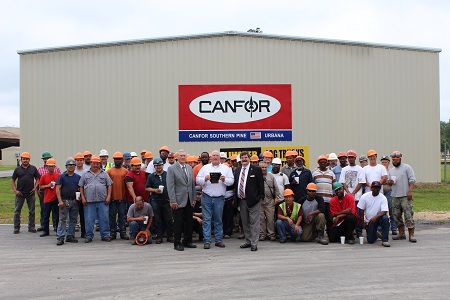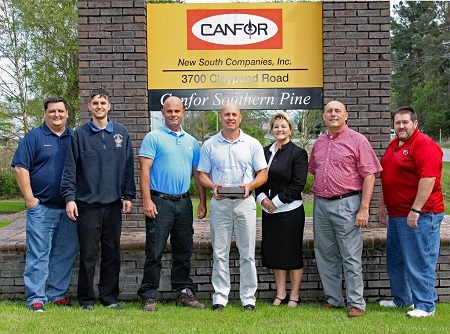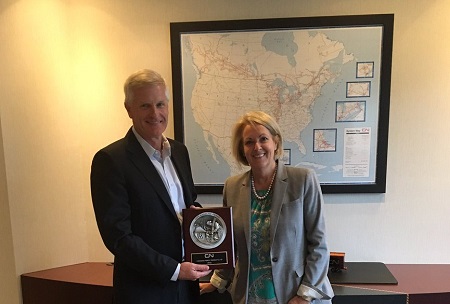Health and Safety
Safety is our single highest priority, and we take pride in the fact that our employees consistently keep us a safety leader in our sector. We regularly undertake events to promote employee involvement in safety, and to continue to raise awareness about the importance of working safely.
Canfor’s Safety Policy affirms every employee’s right to refuse unsafe work, and encourages all employees to report any safety concerns they may have to their supervisor, a safety committee member, or someone in authority.
In 2017, we once again had an impressive safety performance across all our operations with a company-wide medical incident rate (MIR) of 1.68 – the lowest we have ever achieved. Canfor Southern Pine finished the year with an MIR of 1.45 and our Canadian solid wood operations were 1.67 – the lowest single year ever achieved for both. Canfor Pulp was 2.12, the lowest level in a decade. Our safety record is a testament to the continued vigilance and care of our employees.
All Canfor employees are represented by formal joint management-worker health and safety committees. These committees meet regularly to review safety performance, to ensure there is a formal mechanism to bring safety issues forward, and to take action to improve workplace safety. In South Carolina, the safety committee at our Marion, SC mill shared heat awareness and safety tips as part of their Heat is On safety initiative, reminding colleagues to stay hydrated when working in hot, humid weather.
We make sure all of our contractors and sub-contractors meet our high expectations for safety. Canadian Industrial Mill Services, which is involved in the annual maintenance shutdowns and major capital upgrades of our Prince George pulp and paper mills, uses a comprehensive risk assessment process to ensure its employees perform the work safely. In British Columbia, we require that all of our woodlands contractors are SAFE-company certified by the BC Forest Safety Council.
Two mills – Graham, NC, and Urbana, AR – had no recorded incidents and tied for our President’s Safety Awards for sawmills. This was the second year Graham had no recorded incidents, and also the second year it had the lowest overall MIR for the previous three years, at 0.25. The Forest Management Group in BC had an MIR of 0.65, the lowest in forest management and trucking.
Our Fort St. John, BC, pellet plant; Canfor Green Energy in Grande Prairie, AB; Prince George chip plant and Washington, GA, laminating plant also all achieved zero MIR in 2017.
As a testament to our strong performance, our Grande Prairie sawmill received the Outstanding Achievement in Health and Safety (2014-2016) Award from the Alberta Forest Products Association. The mill had the lowest injury rate per person/hours worked over the three-year period among all member sawmills/planer mills with more than 400,000 person hours worked.
Two of our mills were also recognized by the Arkansas Department of Labor for their excellence in on-the-job safety. The 58 employees at our El Dorado Laminating Plant accumulated three years without a lost day due to a work-related injury or illness, from 2014 to 2016, and the 120 employees at our Urbana sawmill marked a year without a work-related injury or illness in 2016.

Our Urbana sawmill was one of two Canfor Southern Pine mills recognized by the Arkansas Department of Labor for excellence in on-the-job safety.
Our Graham, NC, and Jackson, AL, mills were among seven recognized by the Southern Forest Products Association in June for outstanding safety records. Both mills achieved a perfect safety record with no work-related illness or lost-time incidents in 2016. On Oct. 17, 2017 the Graham plant reached 1,000 days of incident-free operation.
Our New South Express (NSE) trucking fleet has a solid reputation for safe operations. In March, it received the Grand Truck Safety Award at the South Carolina Truck Safety Awards Banquet in March for being the safest fleet in South Carolina. It placed first in three categories (private local, private combined and private intercity) and had the lowest medical incident rate for Industrial Safety-Private Carriers. NSE also earned the 1st Place Safety Award from the National Private Truck Council.

New South Express was awarded the Grand Truck Safety Award for being the safest fleet in South Carolina.
“As safety manager, I ensure our drivers and equipment are safe, and that we comply with all the rules and regulations. It’s a big responsibility, one that makes a huge difference for our drivers, as well as their families and everyone else who shares the road with us. I am proud that we are consistently recognized as leaders in industrial truck safety.”
- Amy Johnson, Safety Manager, New South Express
Our Forest Management Group in BC partnered with the Insurance Corporation of British Columbia to raise awareness of the risks presented by distracted driving. Each employee was given a decal to place on the driver’s window of their vehicle to remind them that using a cell phone is not only risky, but against the law. They were invited to join Kevin Horsnell, VP, Woodlands, in making a public commitment to never use a personal electronic device while driving.
We launched a six-week Safe Hands for Summer campaign at our Canadian solid wood operations in July, and found there was a 50% reduction in the number of hand injuries at our Canadian mills in July and August when compared with 2016. Employees were encouraged to keep hand safety top of mind both at work and at leisure while enjoying summer activities.
Taylor Pulp marked a year free of medical incidents on May 29. It also held its annual community Emergency Preparedness Event and BBQ in May to raise awareness about what to do in case of an emergency.

In May, Canfor Pulp was once again recognized by CN for meeting strict standards for the safe handling and shipment of regulated products in 2016. Bob Hayes, VP, Transportation and Corporate Sourcing, accepted the award on behalf of Canfor from CN’s Fiona Murray, VP, Industrial Products.
Canfor was among the sponsors of the one-day Interior Safety Conference 2017 in Prince George, organized by BC Forest Safety and the Interior Logging Association. It brought together more than 100 delegates, and offered practical information and tools to help them understand and resolve safety challenges.
We continue to invest in equipment and training to extract and contain combustible dust at our manufacturing facilities. In British Columbia, where explosions at two sawmills in 2012 led to increased concern about the issue, we have invested more than $25 million for capital and maintenance improvements related to wood dust since 2012.
Across the company, we have made the management of combustible wood dust a key priority. Our operations teams continue to implement engineering solutions to better contain dust at the source and safely remove it from the mill environment. We perform periodic and ongoing audits of our Loss Prevention & Combustible Dust program to ensure it remains robust and well-entrenched in the culture of our facilities.
As a result of our emphasis, over the past two years we have achieved a 99% compliance rate from WorkSafeBC with respect to the management of combustible wood dust in our facilities.